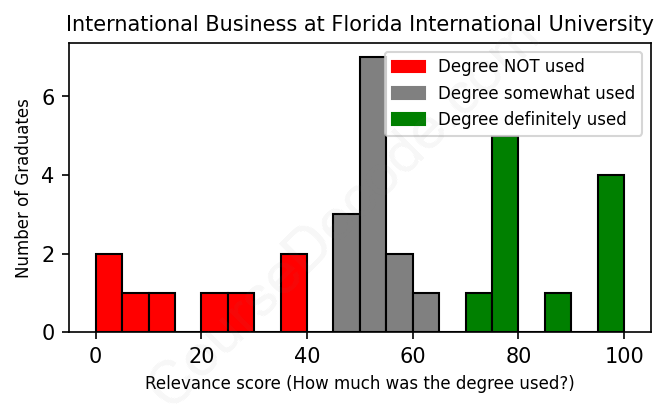
First, some facts. Of the International Business graduates from Florida International University we've analyzed , here's how many have used (or NOT used) their degree in their career:

These are estimates based on AI analysis of 32 LinkedIn profiles (see below).
The verdict? Significantly below average. Overall, with an average relevance score of 54%, International Business graduates from Florida International University have a much lower likelihood (-13%) of finding work in this field compared to the average graduate across all fields:
And for comparison, here's the chart for all profiles we've looked at across all degrees.
Also, after graduating, only 21% of these graduates have pursued further education other than another Bachelor's degree (such as a Masters degree or other), compared to the average across all profiles of 35%. This suggests a Bachelors degree is enough for most International Business graduates, and it's normal to look for work straight after graduation.
See the details:
|
Relevance score: 50% We think this person has gone into a career only somewhat relevant to their degree. We think this person has gone into a career only somewhat relevant to their degree.
DEGREE INFOGraduated in 2010 from Florida International University with a Bachelor of Business Administration (BBA) in International Business. Also pursued further education since (see below). JOB HISTORY SINCE GRADUATIONTechnical Sales Specialist II TSI Incorporated May 2014 - Present FURTHER DEGREES DONE SINCE GRADUATINGMaster of Business Administration (MBA)University of Miami 2010 - 2012 ABOUTACCOMPLISHED DYNAMIC SALES PROFESSIONAL B 2 B Sales | Revenue Generation | Customer Relationship Skills | Strong Financial Acumen |
The top 10 most common jobs done by the graduates we've analyzed (ranked most common to least) are:
When looking at the types of jobs that recent graduates from the International Business program at Florida International University have landed, it seems like there’s a mixed bag. Many have ventured into roles like sales representatives, administrative positions, or banking jobs. For instance, being a Technical Sales Specialist or a Territory Sales Representative relies a bit on business skills but veers more towards sales techniques and doesn't deeply tap into the essence of international business principles. Furthermore, while some graduates became entrepreneurs or founders of their own companies, which certainly connects to international business, others have taken on roles that seem less related, like being an office manager or customer care representative.
Overall, there is a noticeable trend: some roles align well with the principles of international business, particularly positions that involve managing relationships in a global context, like the Associate Account Manager role or Regional Quality Manager. However, a significant number of graduates found themselves in jobs with little direct relevance to their studies. Whether it was because the job market is competitive or the nature of the roles available didn't require specialized knowledge, it paints a picture of varying alignment with their educational background. So, while there are definitely usable skills learned from their International Business degrees, the real-world application doesn't always match up perfectly.
Here is a visual representation of the most common words in job titles for International Business graduates (this is across all International Business graduates we've analyzed, not just those who went to Florida International University):

When looking at graduates from Florida International University's International Business program, it's clear that many of them have carved out some interesting career paths. For their first jobs after graduation, a lot of these alumni gravitated toward roles that involve sales, finance, and management, particularly in sectors such as banking, insurance, and consultancy. For instance, many started as analysts, customer service representatives, or sales associates—positions that provide essential experience in understanding business operations and client relationships. Even graduates from recent years seem to follow this trend, entering roles that are related, if not always directly, to international business functions.
Fast forward five to ten years, and we can see a mixed bag of outcomes. On one hand, many graduates have progressed to managerial or director-level positions within reputable firms, showcasing their growth within their chosen fields. These roles often align well with international business, such as project managers, content acquisition managers, and general managers in global or multi-national companies. However, there are also instances where some graduates have taken roads less travelled, starting their own businesses or shifting to unrelated fields. While it might not be every graduate's story, the overall trajectory appears promising for those who remain connected to their international business roots, indicating that the program does effectively prepare students for diverse, fulfilling career options.
Hey! So, pursuing a Bachelor’s degree in International Business at Florida International University or really anywhere can be a mixed bag when it comes to difficulty. On one hand, you’ll be diving into subjects like economics, marketing, and global trade, which can be a bit challenging if you're not into numbers or complex ideas. But on the flip side, if you’ve got a knack for understanding different cultures and enjoying discussions about global markets, it might feel more manageable. Overall, a lot of students find it to be about average in terms of workload and difficulty—definitely challenging, but not impossible. Just be ready to put in some effort, especially in group projects and case studies!
Most commonly, in the LinkedIn profiles we've looked at, it takes people 3 years to finish a Bachelor degree in International Business.
So, looking at these International Business grads from Florida International University, it seems like they're mostly doing pretty well, though the money definitely varies based on the role and experience. Those who landed jobs in established companies like JPMorgan Chase or made it up to management positions likely have decent salaries, especially over time. Some of the earlier grads started strong in sales and management roles, which usually pay pretty well, but others bounced around a bit, which might mean some instability in earnings. A few even started their own businesses, which can be risky but potentially lucrative if they take off. Overall, while not everyone might be raking in the big bucks yet, many seem to be on promising paths toward solid careers and financial stability.
Here is a visual representation of the most common words seen in the "about" section of LinkedIn profiles who have a Bachelor degree in International Business (this is across all International Business graduates we've analyzed, not just those who went to Florida International University). This may or may not be useful:

Here are all colleges offering a Bachelor degree in International Business (ordered by the average relevance score of their International Business graduates, best to worst) where we have analyzed at least 10 of their graduates:
| College | Score | Count |
|---|---|---|
 Florida International University - College of Business Florida International University - College of Business
|
67 | 13 |
 Berkeley College Berkeley College
|
62 | 11 |
 Rollins College Rollins College
|
61 | 10 |
 University of North Florida University of North Florida
|
59 | 10 |
 University of California San Diego University of California San Diego
|
59 | 10 |
 The University of Texas at San Antonio The University of Texas at San Antonio
|
55 | 10 |
 Florida International University Florida International University
|
54 | 32 |
 San Francisco State University San Francisco State University
|
49 | 16 |
 The University of Memphis The University of Memphis
|
49 | 10 |